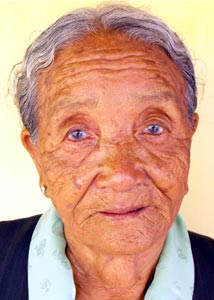Name: Dolma Yangzom
(Alias: No)
Gender: Female
Interview Age: 79
Date of Birth: 1931
Birthplace: Lhasa, Utsang, Tibet
Year Left Tibet: 1959
Profession: Tailoring
Monk/Nun: No
Political Prisoner: No

Interview No.: 42M
Date: 2010-04-12
Language: Tibetan
Location: Doeguling Settlement, Mundgod, Karnataka, India
Categories: Culture and History
Keywords: business practices/livelihood, childhood memories, Chinese -- first appearance of, Chinese army -- invasion by , Chinese rule -- life under, Dalai Lama, Dalai Lama -- escape, escape experiences, March 10th Uprising, Norbulingka, refugee in India -- life as, Utsang
Summary:
Dolma Yangzom had a very special childhood. She spent most of her early years working in the Norbulingka, summer palace of His Holiness the Dalai Lama in Lhasa. Her father was a tailor for His Holiness' family and she helped to stitch clothes and clean for Gyalyum Chenmo, His Holiness' mother, and for his elder sister. She narrates a vivid picture of life at the Norbulingka and her relationship with Gyalyum Chenmo and other family members.
Dolma Yangzom describes the gradual worsening situation in Lhasa and the tumultuous event in March 1959 when the population of the city came out to guard His Holiness the Dalai Lama. Dolma Yangzom was a witness to this event that culminated in the stoning to death of a Tibetan man who was believed to be a spy for the Chinese.
Dolma Yangzom was among His Holiness' entourage during his escape to India. She describes His Holiness' attire, the convoy and the hardships experienced during the journey. In India she and her father took up work in a carpet factory established by the Tibetan-Government-in-Exile.
Interview Team:
- Rebecca Novick (Interviewer)
- Tenzin Yangchen (Interpreter)
- Pema Tashi (Videographer)

